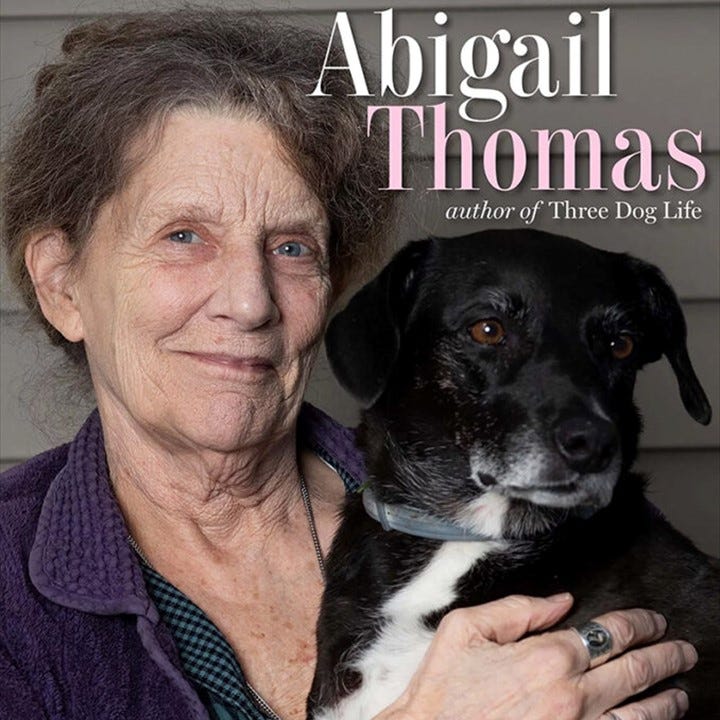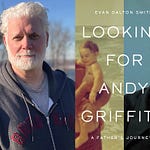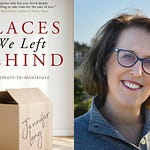Next week, I’ll be back with the final episode of Season 3 featuring book PR/strategist . We discuss why memoirs are so hard to sell right now & what authors can do about that; why book publishing is broken & how to fix it; and much more.
It’s one of my favorite interviews to date and I hope you’ll come away with lots of new insights. This week, I’m running another one of my favorite interviews from the archives, which I’ve just updated.
In this converation with memoirist
we discuss the backstory of writing Safekeeping, and that now-classic memoir was initially turned down by all the editors the book was sent, except for one.We talk about how crafting a memoir-in-fragments like Safekeeping allows a writer to depict memories in a way a more conventional structure doesn’t permit. She talks about why writing what you don’t remember is as important as what you do; and the value of following what interests and obsesses you, even if it doesn't seem to go anywhere at first.
Thomas’s is one of the great voices in memoir—shrewd, warm, devoid of self-pity—and like all wise teachers, she imparts insights about a life well spent, even when talking about a book well-crafted.
Abigail Thomas is the author of several memoirs, including Safekeeping, A Three Dog Life, What Comes Next and How to Like it, and most recently Still Life at Eighty, as well as three works of fiction: Getting Over Tom, An Actual Life, and Herb’s Pajamas.
Some of my biggest takeaways
“Chronological order makes very little sense to me…”
Most of Thomas’s memoirs eschew the conventional chronological approach, opting instead for fragmented structures that mirror the way memory works. Abigail Thomas believes that "life has been lived like a series of moments," and memoirs are stronger when they reflect that movement, rather than opting for a more conventional structure.
Well, I will confess that I have a poor memory, except for the things I remember. So putting them in chronological order makes very little sense to me. It's why this now? Why am I thinking of this now? Why this memory? Write it down. You'll find out why. The trick is not to boss them around, you know. Just let them come, and they will.
This memoir-in-fragments approach unexpectedly draws the reader in
Safekeeping, for example, is comprised of dozens of short sections—some four or five pages, others as brief as a single sentence. Then there’s the narrator herself, frequently switching between past and present tense, or between first- and third-person.
With all that lack of connective tissue, all that shifting of tenses and point-of-view, you’d expect the narrative flow to be constantly disrupted. Instead this approach creates a genuine connection with readers, in part because it invites them to piece together the narrative puzzle
The key to writing a great memoir-in-fragments is to have a strong, unified voice
Married for the first time at 18, remarried at 27—Abigail Thomas’s life was full of wrong turns. She had a lot of living under her belt. Yet the narrator here keeps things light and crisp, avoiding self-judgment. Instead, here the persona is vulnerable, startlingly honest, unsentimental, wry, and above all, entertaining.
In The Situation and the Story, Vivian Gornick writes that great memoirs feature a “truth-telling” narrator. We trust the voices of George Orwell, Annie Dillard, or James Baldwin because they seem so honest and self-aware. Thomas’s narrator is one of these.
“The past is every bit as unpredictable as the future”
The unpredictable nature of memory can be troubling for both writer and reader. Yet, Thomas says that this unpredictability is where the real magic of memoir writing lies. The unpredictable becomes an asset, turning writing into a journey of self-discovery and an act of creative courage.
“I don't believe in chronology. And the older you get, the more you don't believe in chronology or even time. What is it? I mean, I'm at the age now where I live entirely in the moment. Sometimes the moment is a good one, sometimes it's a more interesting one, but that's where I am. I never think about the future. I do have memories, and I write about them because I wrote somewhere, ‘You discover that the past is every bit as unpredictable as the future.’ And for me, the future is behind me. You know, I don't have... I just have now.”
What you don’t remember can be as powerful as what you do
Many writers (me included) tend to get hung up by the fact they don’t remember enough when it comes to memoir. But embracing the fallability of memory is exactly the point of memoir, says Thomas. It’s what makes a narrator more authentic—and believable:
“I really do think that what you don't remember belongs in there, because in the course of writing this, you may begin to remember, or you may begin to remember why you don't remember. But it is interesting for the reader to know that the writer is at least honest enough to say, ‘I don't remember why I did this. I don't remember what came before,’ because it's so human.”
"The more vulnerable you make yourself, the stronger you become”
Thomas urges writers to be honest and vulnerable, since revealing truths about oneself tends to have a liberating effect. This openness serves as a conduit through which readers can see their truths reflected in the author’s life, reinforcing the fact we all tend to feel similar things inside.
The key is to write without an agenda—to connect with an emotion and let go of outcomes.
“You need to write about the stuff you don't wanna write about…[but] you have to find a side door, and it isn't therapy. Writing isn't therapy. But if you're truthful, and honest, and write what you need to write, it has the effect of you've made something out of it separate from yourself, you've revealed things to yourself about yourself, and it's a way of forgiving yourself, you know, and others.”
What listeners are saying about recent episodes
—
on How to Jumpstart your Memoir the Low-Stakes Way—Emily Levinon An Urgent and Possibly Helpful Conversation withJeannine Ouellette
—and essayist
on Season 2!If you like an episode, please leave a comment here or even better, at Apple Podcasts (see the link at the end of this newsletter). It really helps the show get discovered by new listeners.
Discussed on this episode
“Getting Started” - reflections on how Abby started writing Safekeeping
Safekeeping: Some True Stories from a Life Bookshop.org | Amazon
What Comes Next and How to Like it Bookshop.org | Amazon
Still Life at Eighty: The Next Interesting Thing Bookshop.org | The Golden Notebook | Amazon
Read my essay “How to create narrative tension in a memoir-in-fragments” below…
How to create narrative tension when writing a memoir-in-fragments
Today, fragmented or mosaic memoirs (or memoir-in-fragments) feel like they’re everywhere. If you’re unfamiliar with this term, here’s a good definition, from an essay by Sonja Livingston: Written in short, subtitled chapters, the prose moves in loose chronological order as it lays out experience as a series of vibrant vignettes. This structure is someti…
Credits
This episode was produced by Magpie Audio Productions. Theme music is "The Stone Mansion" by BlueDot Productions.


















